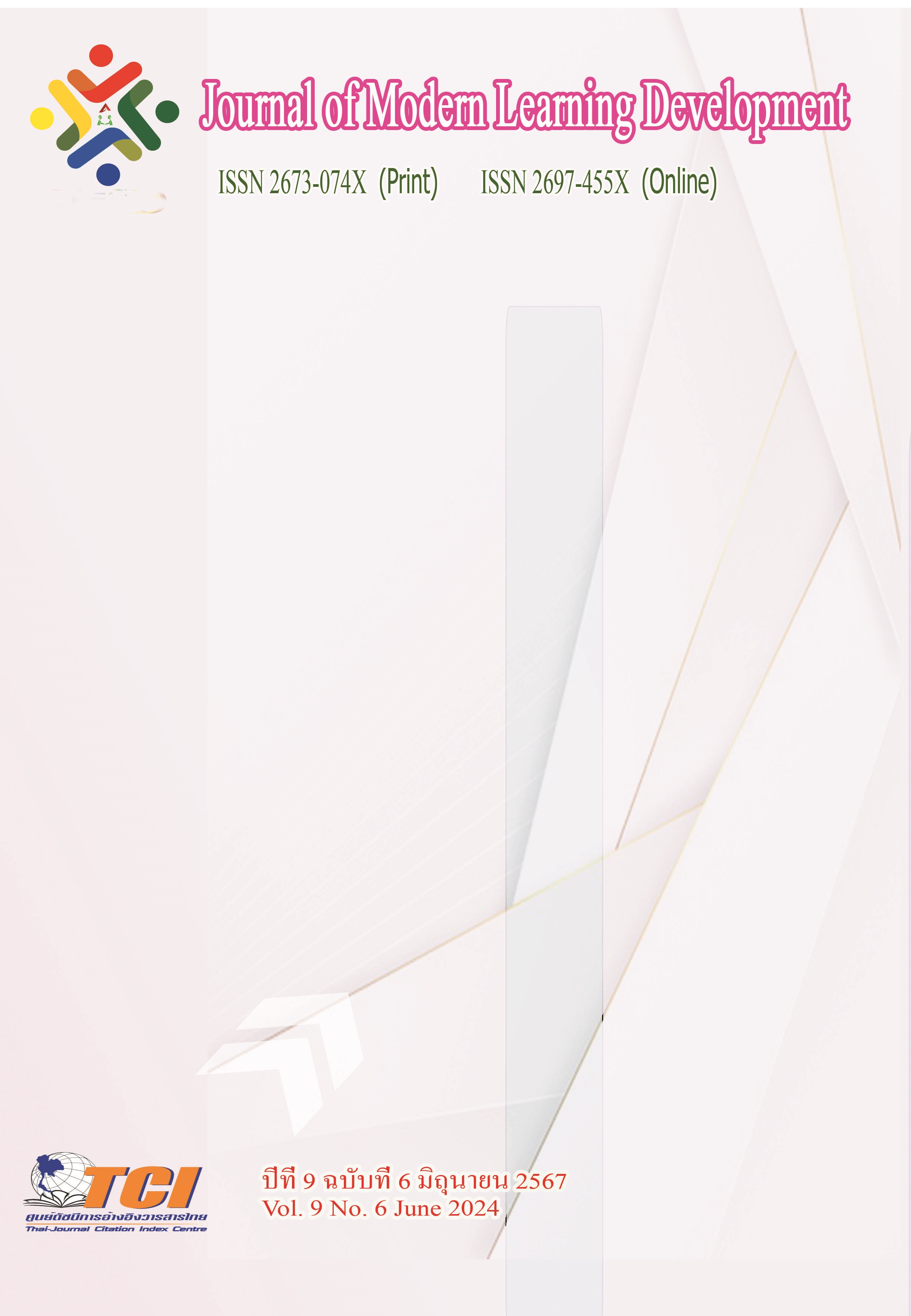Internal Supervision Using The Professional Learning Community Process
Main Article Content
Abstract
Internal supervision using the professional learning community process develops teachers' teaching. effective student learning and effectiveness because it is a driver for continuity and sustainability, administrators, teachers, educational personnel, as well as communities and related parties join in exchanging knowledge and brainstorming ideas to find solutions or develop teachers with good quality. and have the potential to continuously develop oneself. Have the ability to design learning using a variety of teaching activities that meet the potential of the learner. There are developments that elevate the learning management process to be more efficient. There is also the development of students in all aspects so that they can learn happily.
Article Details
References
กระทรวงศึกษาธิการ. (2545). พระราชบัญญัติการศึกษาแห่งชาติ พุทธศักราช 2542. กรุงเทพมหานคร กระทรวงศึกษาธิการ
จุลลี่ ศรีษะโคตร. (2557). บรรยากาศองค์การที่ส่งผลต่อชุมชนการเรียนรู้ทางวิชาชีพของ ครูในสังกัดเทศบาลนครขอนแก่น. วิทยานิพนธ์ ศษ.ม. สาขาวิชาการบริหาร การศึกษา. บัณฑิตวิทยาลัย: มหาวิทยาลัย ขอนแก่น.
ชูชาติ พ่วงสมจิตร์. (2558). ชุมชนการเรียนรู้ทางวิชาชีพ. เอกสารประกอบการบรรยาย ณ วิทยาลัยชุมชนพังงา จังหวัดพังงา เมื่อวันที่ 28 ธันวาคม 2558. กรุงเทพมหานคร: มปท.
ณัฐิกา นครสูงเนิน. (2556). ความสัมพันธ์ระหว่างภาวะผู้นำทางวิชาการของผู้บริหารกับการเป็นชุมชนแห่งการเรียนรู้ของโรงเรียน สังกัดสำนักงานเขตพื้นที่การศึกษา ประถมศึกษาเลย เขต 1. วิทยานิพนธ์ ค.ม. สาขาวิชาการบริหารการศึกษา. บัณฑิตวิทยาลัย: มหาวิทยาลัยราชภัฏเลย.
ดลนภา วงษ์ศิริ. (2556). ความสัมพันธ์ระหว่างการเป็นชุมชนแห่งการเรียนรู้กับประสิทธิภาพการสอนของครูในโรงเรียน สังกัดเทศบาลนครขอนแก่น จังหวัดขอนแก่น. วิทยานิพนธ์ ค.ม. สาขาวิชาการบริหารการศึกษา. บัณฑิตวิทยาลัย: มหาวิทยาลัยราชภัฏเลย.
บุญชม ศรีสะอาด. (2559). แก่นคติแนวคิดเสริมสร้างพลัง. มหาสารคาม: ตักศิลาการพิมพ์.
วรลักษณ์ ชูกำเนิด และเอกรินทร์ สังข์ทอง. (2557). โรงเรียนแห่งชุมชนการเรียนรู้ทางวิชาชีพ เพื่อการพัฒนาวิชาชีพครูที่เน้นผู้เรียนเป็นหัวใจสำคัญ.วารสารวิทยบริการ มหาวิทยาลัยสงขลานครินทร์. 25 (1), 93-102.
วันทนา สมภัคดี. (2563). การพัฒนารูปแบบการนิเทศเพื่อสร้างชุมชนแห่งการเรียนรู้เชิงวิชาชีพครูโรงเรียนในเขตภาคตะวันออกเฉียงเหนือ. วิทยานิพนธ์ปริญญาการศึกษาดุษฎีบัณฑิต สาขาวิชาการนิเทศการศึกษา. บัณฑิตวิทยาลัย: มหาวิทยาลัยมหาสารคาม
วัชรา เล่าเรียนดี. (2556). ศาสตร์การนิเทศการสอนและการโค้ชการพัฒนาวิชาชีพ: ทฤษฎีกลยุทธ์สู่การปฏิบัติ. (พิมพ์ครั้งที่ 12). นครปฐม : มหาวิทยาลัยศิลปากร.
สำนักงานเลขาธิการสภาการศึกษา. (2559). (ร่าง) กรอบทิศทางแผนการศึกษาแห่งชาติ พ.ศ. 2560– 2574.กรุงเทพมหานคร: สำนักงานเลขาธิการสภาการศึกษา กระทรวงศึกษาธิการ.
อธิศ ไชยคิรินทร์. (2562). การพัฒนารูปแบบการนิเทศภายในโดยใช้ชุมชนการเรียนรู้ทางวิชาชีพสำหรับโรงเรียนมัธยมศึกษา. วิทยานิพนธ์ปริญญาการศึกษาดุษฎีบัณฑิต สาขาวิชาการนิเทศการศึกษา.บัณฑิตวิทยาลัย: มหาวิทยาลัยมหาสารคาม
เอกราช โฆษิตพิมานเวช. (2561).วัฒนธรรมองค์การของโรงเรียนเอกชน. วารสารวิชาการธรรมทรรศน์. 18 (3), 363-3
DuFour, R., & Eaker, R. (1998). Professional Learning communities at work: Best practices forenhancing student achievement. Bloomington, IN: Solution. Education Service.
Fullan, M. (1999). Leadership and sustainability: System thinkers in action. San Francisco, CA: Corwin PressJohn W.
Hargreaves, A. (2003). Teaching in the knowledge society: Education in the age of insecurity. New York: Teacher College Press.
Hord, S.M. (1997). Professional learning communities : Communities of inquiry and improvement. Austin : Southwest Educational Development Laboratory. journal.oas. psu.ac.th /index.php/asj/article/viewFile/125/688
Hord, S. M., Roussin, J. L.; & Sommers, W. A. (2010). Guiding Professional Learning. Communities: Inspiration, Challenge, Surprise, and Meaning. Thousand.
Mitchell, C., and Sackney, L. (2001).Communities of leaders: Developing capacity for a learning community. Paper presented at the Annual Conference of the American Educational Research Association, Seattle, Washington
Senge, P. M. (1990). The fifth discipline: The art and practice of the learning organization. Cambridge: Berarek and Newman
Senge, P., et al. (1994). The Fifth Discipline Field Book Strategies and Tools for Building a Learning Organization. Currency Doubleday, New York.
Sergiovanni, T.J. (1991). School principals; School management and organization; School supervision; School improvement programs; United States. Allyn and Bacon (Boston)


